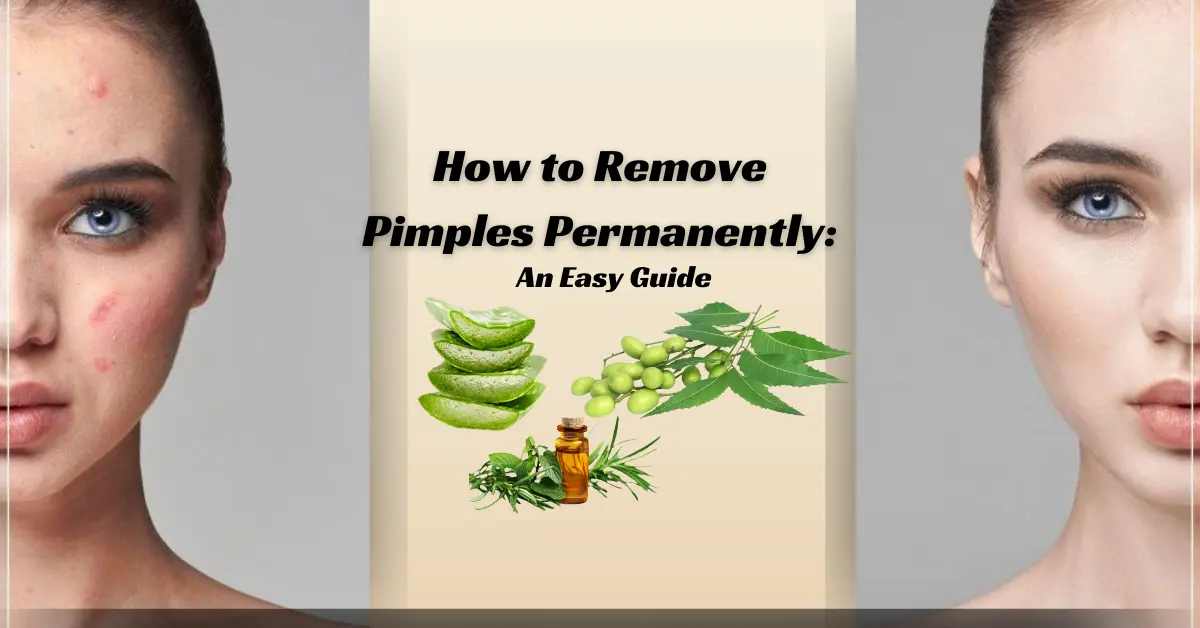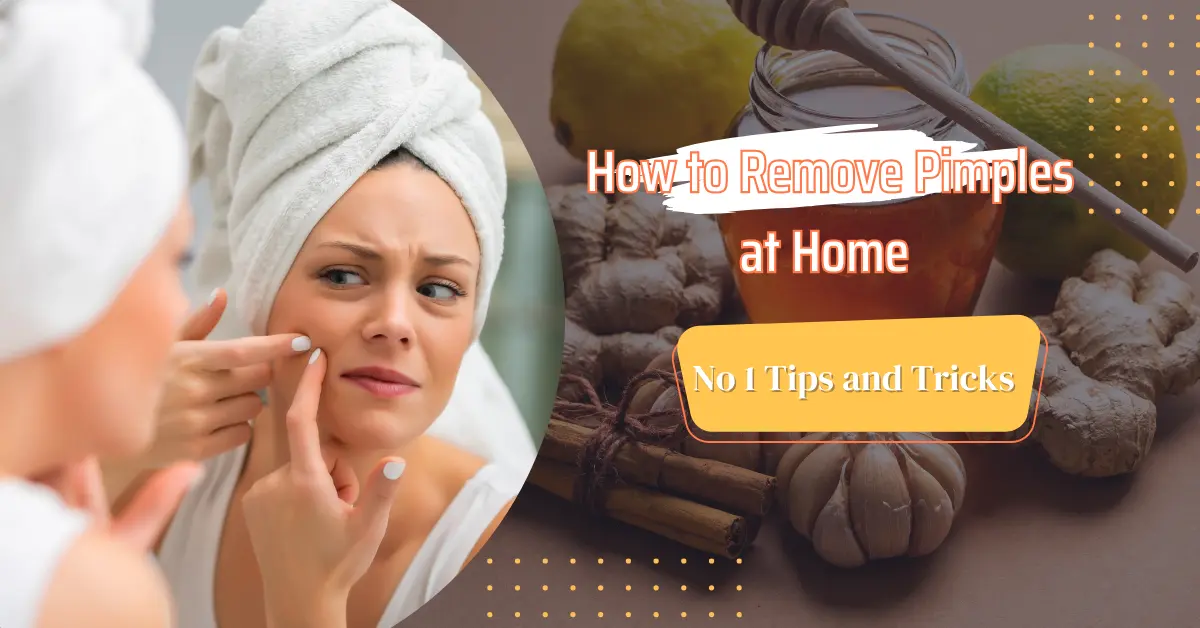
How to Remove Pimples at Home – No 1 Tips and Tricks
- 172
- 0
- 0
How to remove pimples at home
Pimples are a frequent skin issue that can impact individuals of any age. They can be annoying, and painful, and can sometimes leave scars if not treated properly. While there are many over-the-counter and prescription treatments available, many people prefer to try natural remedies at home before resorting to expensive or harsh chemical products. In this blog, we will share some effective tips and tricks to help you get rid of pimples at home.
Understanding Pimples
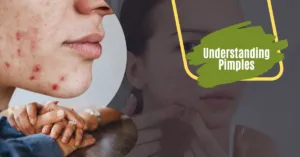
Before we dive into the remedies, it’s important to understand what causes pimples. Pimples are small inflammations or lesions that form on the skin when hair follicles become clogged with oil, dead skin cells, and bacteria. These clogged follicles can become infected, leading to swelling, redness, and sometimes pus-filled bumps.
Factors that can contribute to the formation of pimples include hormonal changes, stress, certain medications, and using heavy or greasy skin care products. While pimples are most common during puberty, they can affect people of any age.
How to Remove Pimples at Home (Some Great Remedies)
Tea Tree Oil
Tea tree oil is a natural antiseptic and anti-inflammatory agent that can help treat pimples. Dilute a few drops of tea tree oil with water or a carrier oil like coconut or jojoba oil, and apply it directly to the pimple using a cotton ball. Leave it on for a few hours or overnight, and repeat daily until the pimple subsides.
Honey
Honey is a natural antibacterial and anti-inflammatory agent that can help dry out pimples and reduce redness and swelling. Simply apply a small amount of raw, organic honey directly to the pimple and leave it on for at least 30 minutes before rinsing it off with warm water.
Aloe Vera
Aloe vera is a natural anti-inflammatory and healing agent that can help soothe and reduce the appearance of pimples. Take some gel from an aloe vera leaf and put it directly on the pimple. Let it sit for at least 30 minutes, then wash it off with warm water.
Lemon Juice
Lemon juice is a natural astringent that can help dry out pimples and kill bacteria. Dilute fresh lemon juice with water and apply it to the pimple using a cotton ball. Leave it on your face for at least 10-15 minutes before rinsing it off with warm water.
Apple Cider Vinegar
Apple cider vinegar has natural antibacterial and anti-inflammatory properties that can help treat pimples. Dilute it with water and apply it to the pimple using a cotton ball. Leave it on your face for 10-15 minutes before rinsing it off with some warm water.
Baking Soda
Baking soda is a natural exfoliant and anti-inflammatory agent that can help dry out pimples and reduce redness and swelling. Mix a small amount of baking soda with water to form a paste, and apply it directly to the pimple. Leave it on your face for 10-15 minutes before rinsing it off with some clean warm water.
Green Tea
Green tea is rich in antioxidants and has anti-inflammatory properties that can help reduce the appearance of pimples. Let a green tea bag steep in hot water for a few minutes, then let it cool. Once it’s cool, apply the tea bag directly to the pimple for 10-15 minutes.
Oatmeal
Oatmeal is a natural exfoliant and anti-inflammatory agent that can help soothe and heal pimples. Make a paste by mixing oatmeal with water or milk, and apply it to the affected area. Leave it on for 15-20 minutes before rinsing it off with warm water.
Additional Tips
In addition to these home remedies, there are some other tips and tricks that can help you get rid of pimples at home:
- Practice good hygiene: Keep your skin clean by washing your face twice a day with a gentle cleanser. Avoid touching your face with dirty hands, as this can transfer bacteria and oils to your skin.
- Exfoliate regularly: Exfoliating helps remove dead skin cells and unclog pores, which can prevent future pimples from forming. Use some gentle scrub or the exfoliating brush once or twice a week for good result.
- Stay hydrated: Drinking plenty of water can help flush out toxins and keep your skin healthy from the inside out.
- Manage stress: Stress can trigger hormonal changes that can lead to pimples. Practice stress-reducing activities like yoga, meditation, or exercise.
- Choose non-comedogenic products: Use non-comedogenic (non-pore-clogging) skincare and makeup products to prevent pimples from forming.
- Avoid picking or popping: While it can be tempting to pick or pop pimples, this can worsen the situation and lead to scarring or infection. Let the pimple heal naturally or use one of the home remedies mentioned above.
Remember, after knowing how to remove pimples at home & while these home remedies can be effective for mild to moderate pimples, it’s important to consult a dermatologist if you have severe acne or if your pimples are not responding to home treatment. Consistent and patient application of these natural remedies, combined with good skincare habits, can help you achieve clear and healthy skin.
Dietary Changes to Consider

What you eat can have a significant impact on your skin health and the formation of pimples. Here are some of the dietary changes that may help to prevent the pimples:
- Limit dairy products: Some studies suggest that dairy products, particularly those with a high glycemic index, can contribute to the development of pimples. Consider reducing your intake of milk, cheese, and other dairy products to see if it improves your skin.
- Increase zinc intake: Zinc is an essential mineral that plays a crucial role in skin health and wound healing. Zinc-rich foods include oysters, beef, spinach, and pumpkin seeds for a healthy diet. You can also consider taking a zinc supplement after consulting with your healthcare provider.
- Eat more antioxidant-rich foods: Antioxidants help protect your skin from damage caused by free radicals, which can lead to inflammation and pimples. Load up on fruits and vegetables like berries, tomatoes, leafy greens, and citrus fruits.
Dealing with Acne Scars
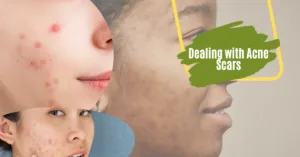
Even after successfully treating pimples, you may be left with unsightly acne scars. Here are some tips for dealing with acne scars at home:
- Use over-the-counter scar treatments: Look for products containing ingredients like vitamin C, retinol, or alpha-hydroxy acids, which can help fade acne scars over time.
- Try natural remedies: Some natural remedies like aloe vera, honey, and lemon juice can help lighten and minimize the appearance of acne scars.
- Exfoliate regularly: Gently exfoliating your skin can help remove dead skin cells and promote cell turnover, which can reduce the appearance of acne scars.
- Consider professional treatments: For stubborn or severe acne scars, you may want to explore professional treatments like chemical peels, microneedling, or laser resurfacing.
Preventing Future Breakouts

While treating existing pimples is important, it’s equally crucial to take steps to prevent future breakouts. Here are some tips to help you maintain clear skin:
- Cleanse and moisturize daily: Establish a consistent skincare routine that includes cleansing and moisturizing to keep your skin balanced and healthy.
- Change pillowcases frequently: Dirt, oil, and bacteria can accumulate on pillowcases, which can lead to breakouts. Change your pillowcases regularly, ideally every few days.
- Manage stress: As mentioned earlier, stress can be a significant contributor to pimples. Incorporate stress-reducing activities like yoga, meditation, or exercise into your routine.
- Avoid harsh skincare products: Harsh skincare products containing alcohol, fragrances, or harsh chemicals can strip your skin of its natural oils and disrupt its barrier function, leading to breakouts.
- Consider birth control: For women, hormonal fluctuations can often trigger pimples. If your breakouts are related to hormonal changes, your dermatologist may recommend birth control pills to help regulate your hormones and improve your skin.
Keep in mind that everyone’s skin is unique, and a treatment that helps one person might not be effective for another. Be patient and consistent with your approach, and don’t hesitate to seek professional help if your pimples persist or worsen.
FAQs
Q1: What’s a quick way to remove pimples at home?
A: Try applying a small amount of tea tree oil or spot treatment with salicylic acid directly on the pimple. Use a clean cotton swab and do this twice daily. Remember to be gentle and patient, as results take time.
Q2: Can I use household items to treat pimples?
A: Yes! Try a honey mask or dab some aloe vera gel on the pimple. Ice can help reduce swelling. Mix baking soda with water to make a paste for spot treatment. Always test on a small body part and area first for the reaction test.
Q3: How can I prevent more pimples from appearing?
A: Wash your face twice daily with a gentle cleanser. Use oil-free moisturizer and sunscreen. Don’t touch your face often. Change pillowcases regularly. Eat a balanced diet and stay hydrated. Manage stress through exercise or meditation.
Q4: Are there any natural remedies for pimples?
A: Try applying green tea, apple cider vinegar, or lemon juice to the affected area. These have natural antibacterial properties. Crush aspirin tablets into a paste for spot treatment. Always dilute strong ingredients to avoid skin irritation.
Q5: When should I see a doctor about my pimples?
A: If home remedies don’t work after a few weeks, or if your acne is severe, painful, or leaves scars, consult a dermatologist. They can provide stronger treatments and personalized advice for your skin type.
Also Read:
No 1 Solutions For How to Remove Pimples Naturally at Home
How to Remove Pimples And Dark Spots- Guide 2024
References:
https://www.ncbi.nlm.nih.gov/books/NBK279208/
https://www.ncbi.nlm.nih.gov/pmc/articles/PMC3080563/
https://en.wikipedia.org/wiki/Pimple
Disclaimer: The tips and tricks provided in this blog for removing pimples at home are for informational purposes only and should not be considered medical advice. Consult a dermatologist or healthcare provider for personalized treatment and skincare recommendations.
Related post
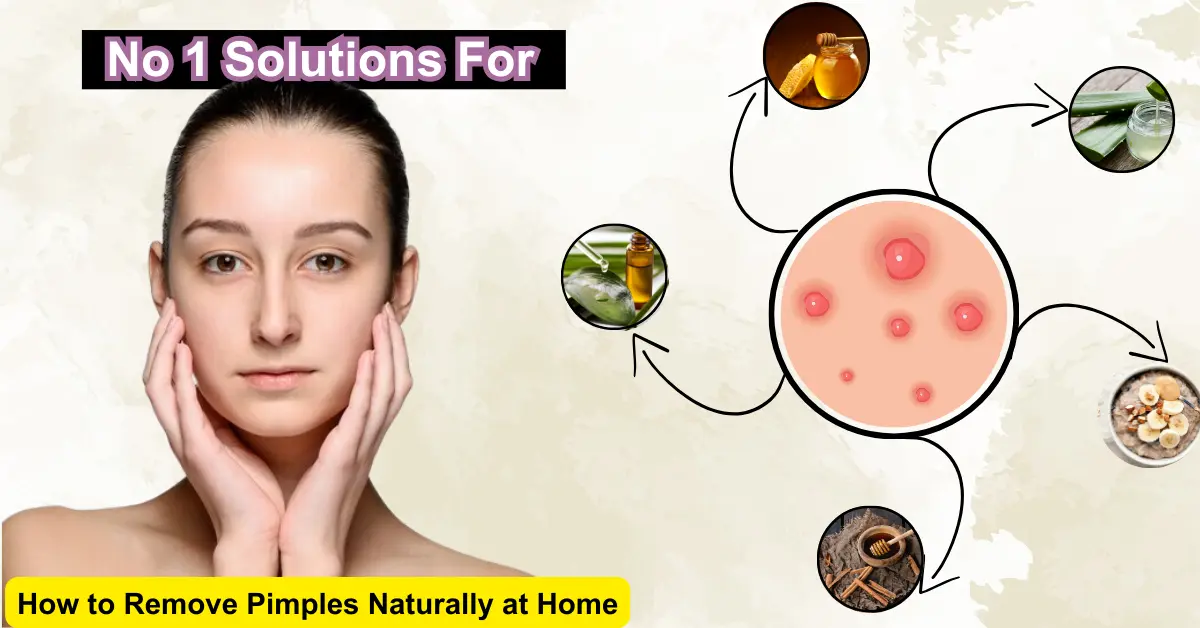
No 1 Solutions For How to Remove Pimples Naturally at Home
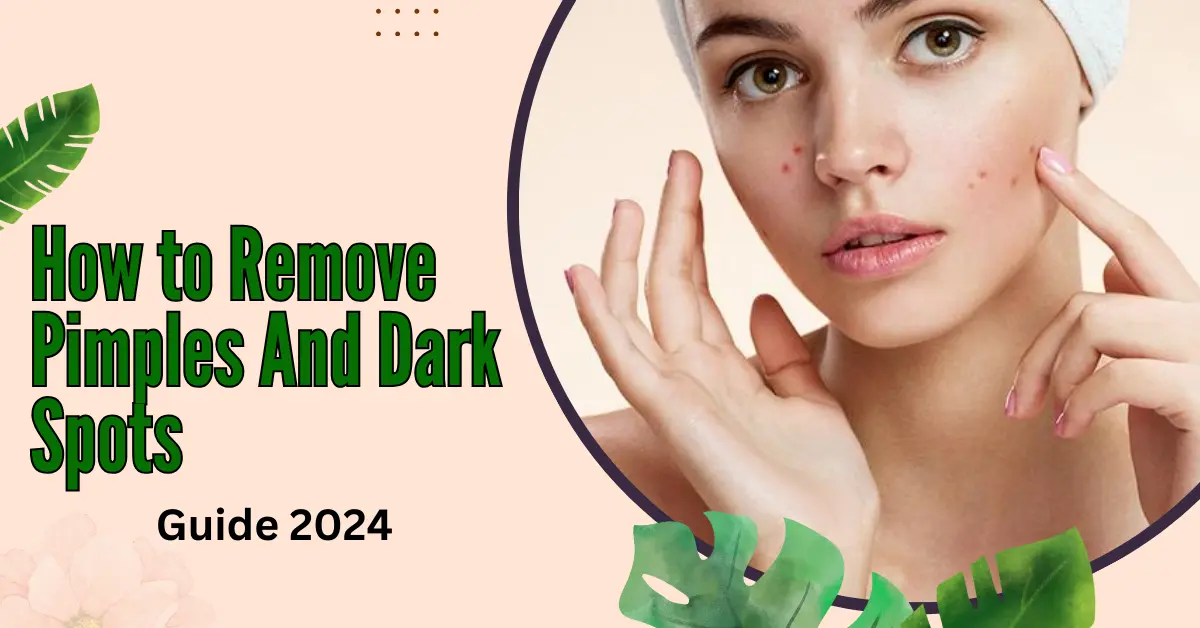
How to Remove Pimples And Dark Spots- Guide 2024
